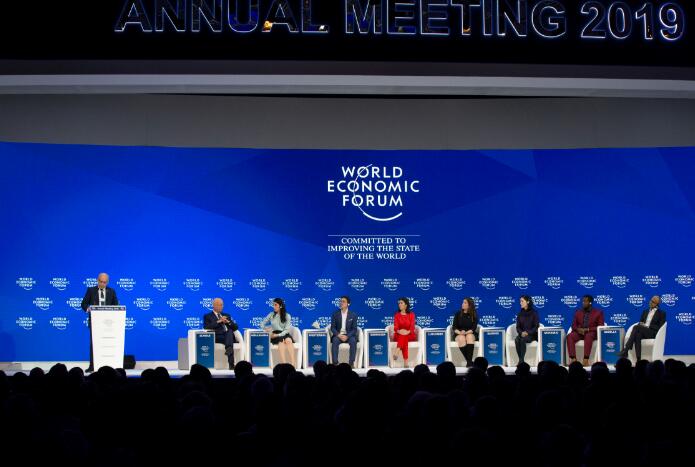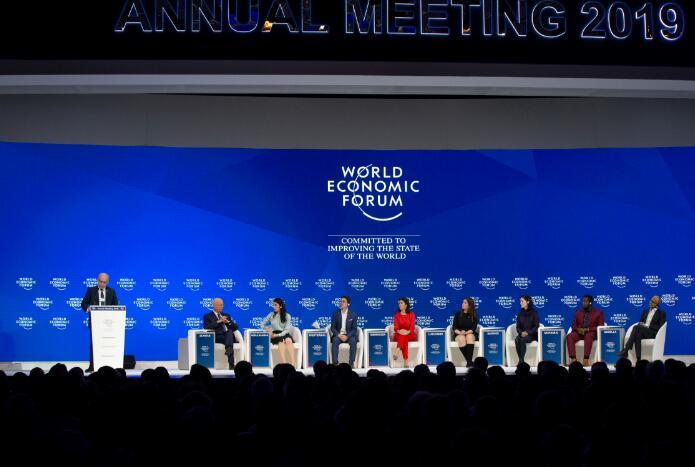
File Photo: Ueli Maurer (1st L), president of the Swiss Confederation, speaks at the 49th Annual Meeting of the World Economic Forum (WEF) in Davos, Switzerland, Jan. 22, 2019. (Xinhua/Xu Jinquan)
DALIAN, China, June 30 (Xinhua) -- Against the backdrop of significant changes of the global economy and geopolitical landscape, continuous new technological advances and multiple environmental challenges, the world has entered a new era of globalization.
More than 1,900 politicians, scholars, business leaders and media representatives from over 100 countries are expected to discuss inclusive development here at the upcoming Summer Davos on July 1-3 under the theme "Leadership 4.0: Succeeding in a New Era of Globalization."
However, just as Hee Ok Lee, director of the Sungkyun Institute of China Studies of Sungkyunkwan University in South Korea, has said, isolationism and unilateralism aim to counter globalization at a time when no country can exist in isolation.
A new development path featuring more openness, sustainability and inclusiveness is necessary in order to explore a new model for global cooperation.
TOWARDS INCLUSIVENESS
This year's forum focuses on Globalization 4.0, and explores how to set up a technology-oriented, more sustainable and inclusive cooperative system, said Klaus Schwab, founder of the World Economic Forum (WEF).
More than 200 penal sessions and discussions will be held during the forum, while a series of reports and statements will also be published.
Sticking to the path of globalization and improving global leadership and governance are the solution to the imbalance and disorderliness of globalization, said Medardo Bombita, director of Political Science Department of University of Rizal System.
"The forum needs to tackle measures for economic equity and social safeguards," Bombita said, expressing hope that attendees from the political, economic and academic sectors could contribute ideas for setting a more fair, reasonable, open and win-win cooperative mode in order to solve deep-rooted problems in global governance.
"The challenges for globalization at the moment is that globalization has produced inequalities, inequality between countries and inequalities within countries," said Hans Hendrischke, professor with the Business School of University of Sydney.
The Summer Davos forum will build for all sides an open and inclusive discussion platform, urge all countries to strengthen exchange and cooperation, continue to maintain and jointly build an open world economy and steer globalization in the direction of win-win cooperation, said Zeng Yi, president of Australian Chinese Finance Organization.
CHINA'S SOLUTION
China's diplomatic concept of building a community with a shared future for mankind has provided theoretical nutrition for promoting more open, inclusive, balanced and win-win economic globalization.
Among them, the China-proposed Belt and Road Initiative (BRI) has drawn the attention of the international community.
"The Belt and Road is in fact a new form of globalization. And that is a real contribution," Hendrischke pointed out.
Starting from infrastructure, the initiative brings technology and funds to poor and less developed countries, enabling them to share the outcomes of globalization, he said.
"The present BRI is expected to improve regional and global cooperation and connectivity on a trans-continental scale with the construction of a vast network of railways, energy pipelines, highways, and streamlined border crossings, among many others," Bombita said.
"It is still the most proactive approach by China towards international cooperation and takes all the risks of responsibility," he added.
David Aikman, chief representative officer of the WEF's China Office, said that against the backdrop of increasing uncertainties and instabilities across the globe, the world expects more ideas and proposals from China.




 A single purchase
A single purchase









